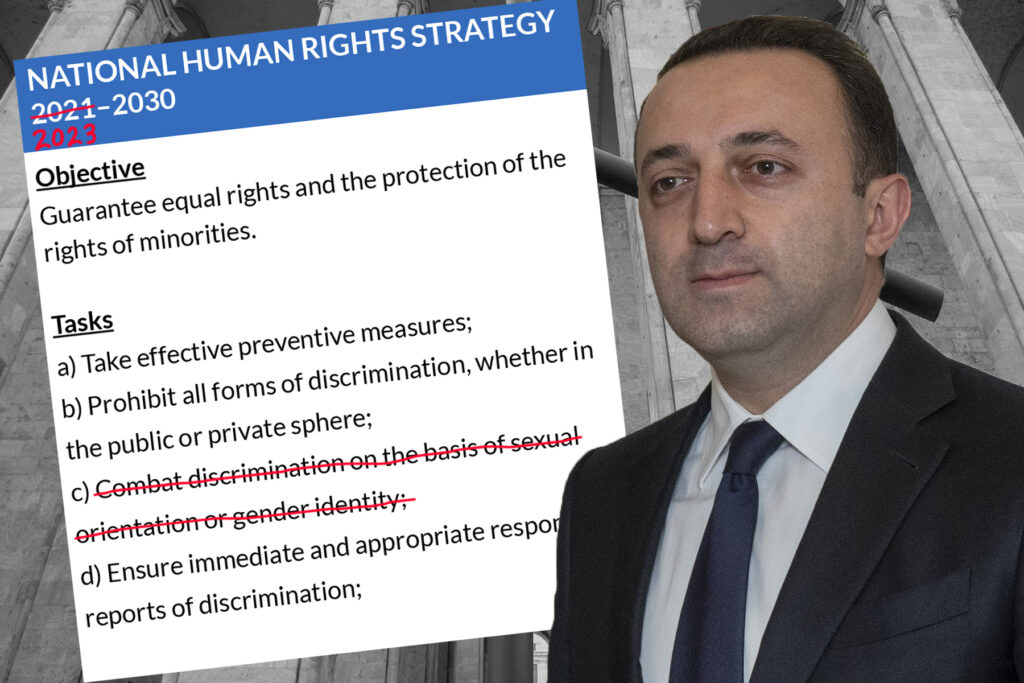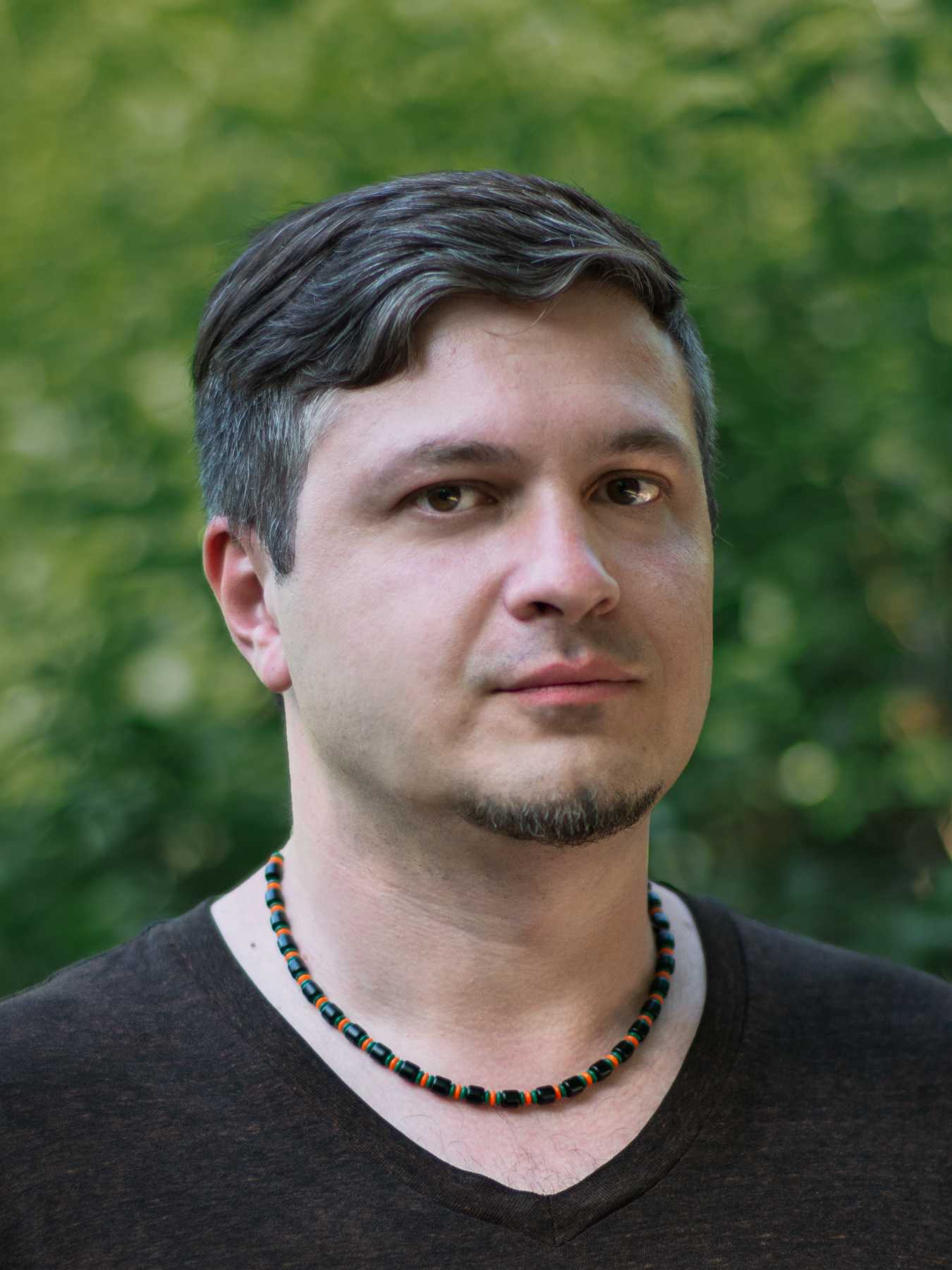Two years after Georgia’s previous human rights strategy expired, the government has finally drawn up a new document. But the long-awaited update has not been universally well received, in particular because it has removed mention of protecting the rights of queer people.
When the Georgian Dream government, then a coalition, passed the country’s first human rights strategy for 2014–2020, it included a commitment to ‘combat discrimination on the basis of sexual orientation or gender identity’. But since then, the government has taken a conservative turn, with the renewed strategy for 2023–2030, late as it is, having removed this as a key task of the government.
The new strategy has been adopted by the government and forwarded to the Parliament for final approval.
A community ignored
The document has already met with disapproval from queer community groups.
On 10 December 2022, the ruling party discussed the draft strategy with several local watchdog groups, including queer rights advocates. But the activists OC Media spoke with said the government had failed to properly involve community leaders in the drafting process — and ignored their feedback anyway.
‘Community groups jointly addressed the government with recommendations and we also raised them during the [10 December] meeting, but they disregarded them’, Tbilisi Pride co-director Ana Subeliani told OC Media.
According to Subeliani, the ruling party indicated that they dropped references to the protection of queer rights to ensure the strategy gained enough support from their own MPs.
‘Their position is that we are right, but that this is a political decision’, Subeliani said.

She added that the government had promised to include steps to tackle intolerance and discrimination towards queer people in the related ‘Action Plan’.
But there is little trust in the government among activists.
Ana Aptsiauri, a legal officer at the Georgian queer advocacy group, the Equality Movement, corroborated Subeliani’s account of the government’s position, dismissing their explanation.
‘It’s a lie, to say the least. LGBTQI issues were included in the previous strategy document’, Aptsiauri told OC Media.
‘A deliberate erasure of various issues from the political agenda is apparent’, she said, adding that the government did not respond to their feedback after the organisation got hold of a draft indirectly, through their partners.
She described the document as ‘general and sterile’ bereft of any reference to queer groups but also of the ‘government’s vision on how to tackle hate crimes and far-right/violent groups effectively’.
A step backwards on queer rights
While the Georgian government have consistently failed to uphold their commitments to protect queer people since coming to power in 2012, the lack of even a token commitment in the new human rights strategy has been seen by many as a further step backwards.
‘While for years we have criticised the state’s inconsistent or superficial vision in this area’, the Equality Movement’s Ana Aptsiauri said, ‘currently that vision is gone entirely — a vision for how to ensure equality, tackle hate speech and hate-motivated crimes, ensure social justice and political participation’.
She added that the government’s willingness to cooperate with civil society groups had also ‘radically changed over the past two years’.
Natia Mezvrishvili was the head of the Government Administration which spearheaded the initial work for the second human rights strategy in 2020.
Mezvrishvili told OC Media that references to queer people had been deliberately removed after Irakli Gharibashvili replaced Giorgi Gakharia as Prime Minister in 2021.

‘The initial version had a separate space dedicated to the protection of the rights of LGBT groups’, Mezvrishvili claimed, adding that ‘the LGBT group has been entirely erased from policy priorities’.
Mezvrisvhili left her position in late 2020 along with Gakharia to serve as deputy chair of his newly created party, For Georgia.
A broader conservative turn
According to Mezvrishvili, the new strategy had been weakened in several other ways, including disregarding one of the key priorities the EU outlined for Georgia as a precondition to reconsider its membership candidacy — to ‘notably consolidate efforts to enhance gender equality and fight violence against women’.
‘One of the indicators of its implementation is an approximation of the definition of sexual violence, and to put it more clearly, of rape, with international standards. There is no word about it’, Mezvrishvili noted.

[Read more on OC Media: Consent not required: how Georgian legislation allows rapists to walk free]
Mezvrishvili said this was part of a wider change in the government’s priorities, citing the removal of the term ‘gender equality’ from the Prime Minister’s human rights advisor’s title in August 2021 as among the first warning signs of this change of course.
She also listed the lack of punishment for the organisers of the July 2021 homophobic riots in Tbilisi. ‘We listened to the government statements that supported [the organisers]’, she said.

The Mtsvaneebi (‘Greens’), the first openly pro-queer political party in Georgia, also condemned the new strategy, describing it as a part of a broader effort to ‘erase queer people from institutional politics of human rights’.
They cited the removal of references to ‘gender identity’ and ‘gender-nonconforming persons’ from an initial draft of the new State Concept on Gender Equality, reverting the definition of ‘gender equality’ to a version adopted 17 years ago.

‘The documents that have been adopted reflect a regress in the human rights area and create a danger of the state becoming more homophobic and transphobic’, the Mtsvaneebi warned on 23 December.
Little hope of change
Despite the Georgian Government having committed to protecting the rights of minorities, including in their bid for EU candidacy, the international reaction to the apparent shortfalls of the new human rights strategy has been muted.
In an 18 January report, the Tbilisi-based think-tank, Georgia’s Reforms Associates (GRASS), identified the protection of vulnerable groups as among the priorities defined for Georgia by the EU that had remained unaddressed.
Asked what they thought of this omission, the EU Delegation to Georgia said they had ‘raised the need for an inclusive new National Human Rights Strategy and the follow up Action Plan that encompasses the rights of all social groups, including the vulnerable and marginalised communities’.
The UN Development Programme, which helped work with the government to draft the new strategy, was slightly more explicit, highlighting specifically the importance of protecting the rights of queer people, though without criticising the government’s approach openly.
‘Human rights are universal and so apply to us all’, Nick Beresford, UNDP Resident Representative in Georgia told OC Media. ‘The UN will always pay particular attention to those at most risk of having their rights denied. This includes national, ethnic and religious minorities, LGBTQI communities, and people living with disabilities’.
Beresford said he ‘welcomed’ the new strategy while adding that the UNDP was ‘committed to assisting in developing an action plan and in the work ahead’.

The French Embassy in Georgia explicitly noted ‘the mention of LGBTIQ persons’ among the ‘important’ parts missing in the document.
‘We hope that these points will be discussed in the Action Plan so that the rights of the entire population is protected in Georgia’, the Embassy said.
But there is little sign the government intends to change course.
Mikheil Sarjveladze, Chair of the Parliamentary Committee on Human Rights and Civil Integration, told OC Media that lawmakers were still getting acquainted with the new human rights strategy.

He declined to say whether the committee saw the omission of queer people as problematic, adding only that this issue was discussed at the 10 December meeting with civil society groups.
Asked about the omission of queer people from their human rights strategy, the Prime Minister’s Office, after much prevaricating, declined to comment.




 27 January 2023
27 January 2023




